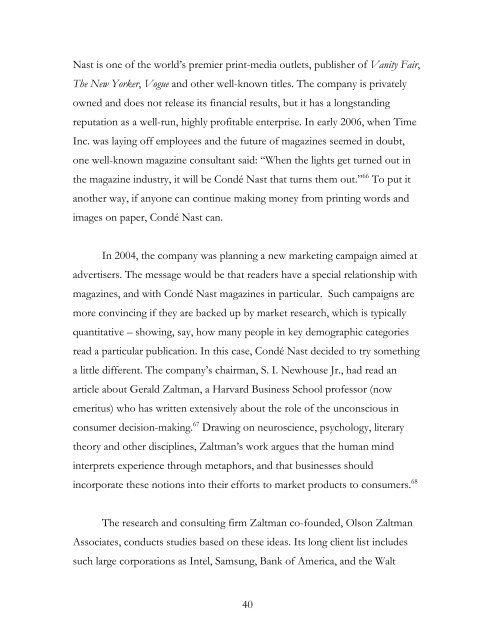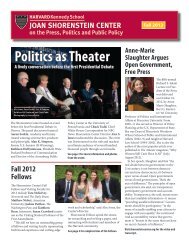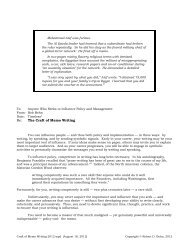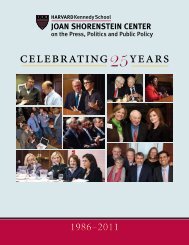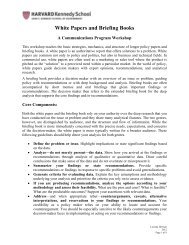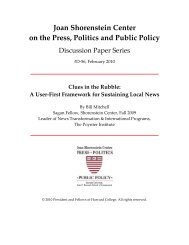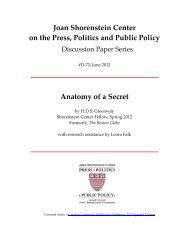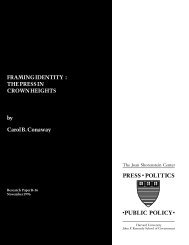Why Paper Is Eternal - Joan Shorenstein Center on the Press ...
Why Paper Is Eternal - Joan Shorenstein Center on the Press ...
Why Paper Is Eternal - Joan Shorenstein Center on the Press ...
You also want an ePaper? Increase the reach of your titles
YUMPU automatically turns print PDFs into web optimized ePapers that Google loves.
Nast is <strong>on</strong>e of <strong>the</strong> world’s premier print-media outlets, publisher of Vanity Fair,<br />
The New Yorker, Vogue and o<strong>the</strong>r well-known titles. The company is privately<br />
owned and does not release its financial results, but it has a l<strong>on</strong>gstanding<br />
reputati<strong>on</strong> as a well-run, highly profitable enterprise. In early 2006, when Time<br />
Inc. was laying off employees and <strong>the</strong> future of magazines seemed in doubt,<br />
<strong>on</strong>e well-known magazine c<strong>on</strong>sultant said: “When <strong>the</strong> lights get turned out in<br />
<strong>the</strong> magazine industry, it will be C<strong>on</strong>dé Nast that turns <strong>the</strong>m out.” 66 To put it<br />
ano<strong>the</strong>r way, if any<strong>on</strong>e can c<strong>on</strong>tinue making m<strong>on</strong>ey from printing words and<br />
images <strong>on</strong> paper, C<strong>on</strong>dé Nast can.<br />
In 2004, <strong>the</strong> company was planning a new marketing campaign aimed at<br />
advertisers. The message would be that readers have a special relati<strong>on</strong>ship with<br />
magazines, and with C<strong>on</strong>dé Nast magazines in particular. Such campaigns are<br />
more c<strong>on</strong>vincing if <strong>the</strong>y are backed up by market research, which is typically<br />
quantitative – showing, say, how many people in key demographic categories<br />
read a particular publicati<strong>on</strong>. In this case, C<strong>on</strong>dé Nast decided to try something<br />
a little different. The company’s chairman, S. I. Newhouse Jr., had read an<br />
article about Gerald Zaltman, a Harvard Business School professor (now<br />
emeritus) who has written extensively about <strong>the</strong> role of <strong>the</strong> unc<strong>on</strong>scious in<br />
c<strong>on</strong>sumer decisi<strong>on</strong>-making. 67 Drawing <strong>on</strong> neuroscience, psychology, literary<br />
<strong>the</strong>ory and o<strong>the</strong>r disciplines, Zaltman’s work argues that <strong>the</strong> human mind<br />
interprets experience through metaphors, and that businesses should<br />
incorporate <strong>the</strong>se noti<strong>on</strong>s into <strong>the</strong>ir efforts to market products to c<strong>on</strong>sumers. 68<br />
The research and c<strong>on</strong>sulting firm Zaltman co-founded, Ols<strong>on</strong> Zaltman<br />
Associates, c<strong>on</strong>ducts studies based <strong>on</strong> <strong>the</strong>se ideas. Its l<strong>on</strong>g client list includes<br />
such large corporati<strong>on</strong>s as Intel, Samsung, Bank of America, and <strong>the</strong> Walt<br />
40


